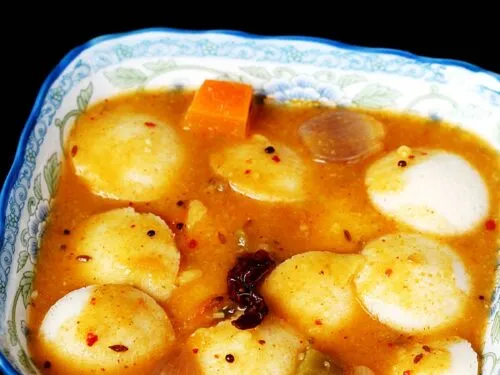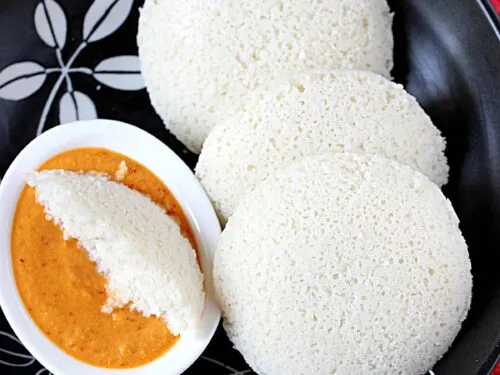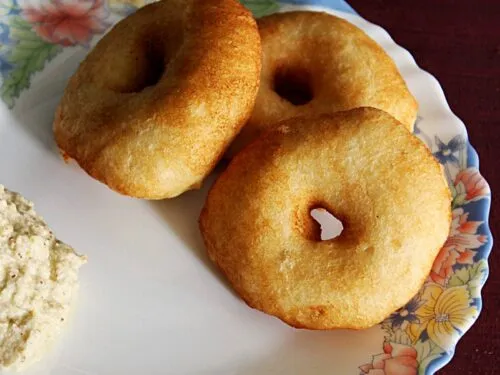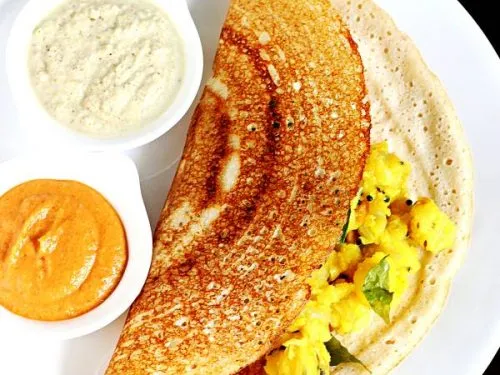Sambar Recipe, How to Make Sambar
Updated: April 29, 2023, By Swasthi
Sambar Recipe! Make the ultimate Sambar at home with this easy recipe! Sambar, a South Indian lentil and mixed vegetable stew is the comfort food at its best. This classic dish is so easy to make and is so heavenly that you will turn to time and again. This traditional Sambar is hearty, super flavorful and loaded with vegetables, spices and herbs. Not to mention, it’s healthy, protein packed and keeps you full longer. Serve it with rice, Soft idli, plain Dosa, Crispy Medu Vada or Ven Pongal.
This traditional dish is believed to provide a complete nutrition to the body as it is nutrient dense. So it is a staple in most South Indian households. Sambar is also a popular food in tiffin centers and restaurants, and is served as a side in meals, as a breakfast combo – idli sambar, vada sambar and is also served with dosa, masala dosa and the list goes on.
We Indians eat lentils almost daily as they are a primary source of protein. So sambar is widely eaten as a part of healthy protein rich diet in South India. Since a variety of mixed vegetables are also used to make sambhar it becomes nutrient dense.
This sambar recipe is very close to my heart as I have fond memories of my Mom making this for us with home-grown veggies and herbs. Once you make this I am sure you will fall in love this amazingly delicious sambar.
This sambar pairs best with short grain rice, some stir fried vegetables and papad on the side will compliment your meal. It can also be served for a breakfast with idli, dosa, bonda, pongal and even with vada.
If you are new to South Indian Cuisine and wondering
About Sambar
Sambar is a South Indian stew made with lentils, mixed vegetables, tamarind, herbs, spices & a special aromatic spice powder known as sambar powder. This spice powder is the key to make a good sambar. A variety of spices & lentils are used to make this powder. Most traditional homes make their own sambhar masala powder to suit their taste buds.
In the modern times, many people prefer to buy the store bought powder as it is convenient. I avoid buying any spice powders and prefer to make my own for the best aroma and taste. Most times I make the instant powder while the dal cooks as nothing beats the aroma of fresh roasted & ground sambar powder.
In this post I have also shared the recipe of sambar powder just enough for this sambar recipe. So I suggest making the sambhar powder too while you cook the dal as it is more flavorful, hygienic & you know what goes into it.
You also can check this post on how to make Sambar Powder if you prefer to stock up for a month or two. If you have the powder ready, it is very quick to make the vegetable sambhar anytime.
Making Sambar
There are different ways a sambar is made. But as I mentioned this is my mom’s recipe so I make the same way and always felt every step I shared below is the key to enhance the flavour and taste quotient.
- The first step is to pressure cook lentils until soft and mushy. You can either pressure cook or cook them in a pot.
- The second step is to cook mixed vegetables until tender in lots of water.
- Then the third step is to simmer the vegetable stock with sambar powder.
- Next dal is mixed and simmered briefly to mingle with the amazing flavors.
- Lastly an aromatic tempering is done to give a final touch to the sambar. This is done by frying the spices & herbs in pure ghee or oil & poured over the cooked sambhar.

Photo Guide
How to make Sambar (Stepwise Photos)
Cook Dal
1. Cook 3/4 cup toor dal with 2 cups water till mushy and soft. You can use only tur dal or a combination of tur dal, moong dal and masoor dal. I use ½ cup toor dal and ¼ cup moong dal. The taste & texture of the sambhar depends on the dal used.
To get a hotel style sambar, use masoor dal and tur dal in equal quantities. If cooking dal in pressure cooker, let it whistle for 2 to 4 whistles on a medium flame. To cook in a Instant pot, pressure cook for 9 mins. If you do not have a cooker, then cook in a pot adding more water as needed.

Once the pressure releases, mash the dal with a potato masher or with a laddle. Dal must be soft & fully cooked. That gives a good texture to the sambhar. Traditionally it was mashed with a wooden masher.

Make Spice Powder
2. While the dal cooks, make the sambar powder. If you have a ready made powder skip this step. On a medium flame, dry roast 4 to 5 dried red chilies, 1 tablespoon chana dal & 1 teaspoon urad dal till golden. Then add 1 tablespoon coriander seeds fry until aromatic. Remove to a plate.
Dry roast ½ teaspoon methi seeds (fenugreek seeds) until slightly dark. Lower the flame, then add ½ teaspoon cumin and fry for a minute until aromatic. Cool all of them and powder finely. Keep this aside.
Prepare Vegetables
3. Rinse and chop all the vegetables of your choice. I generally use shallots or small onions, tomato, drumstick, bhindi (okra) & carrots.
- 1 medium onion (diced) or 12 to 15 shallots (peeled)
- 1 to 2 vegetable drumsticks (cut to 3 inch pieces)
- 2 to 3 okra (bhindi) (1 inch pieces)
- 1 medium carrot (diced to 1 inch cubes)
- 1 large tomato (diced or chopped)
- Optional – Red pumpkin (2 pieces diced to 2 inch each)
- optional – Eggplant / brinjal (quartered or diced)

Cook Vegetables for Sambar
4. Heat 1 teaspoon oil in a large pot. Saute onions for a minute and then add all veggies. Saute for 2 mins and then stir in add ½ to ¾ teaspoon red chilli powder (optional). Pour 4 cups water & give a good stir.
Sautéing veggies is an optional step but recommended. Some kinds of onions, tomatoes and chilli powder don’t smell good when boiled directly so it is good to saute. If you are using shallots then you can completely skip the saute step.

5. When the water in the pot turns hot, take some hot water with a ladle and pour it to a small bowl. Add 1 to 2 tablespoons tamarind (the size of a small lemon) & 1 tablespoon jaggery (optional). Set aside to soak.

6. When the veggies are cooked al dente, add
- ¼ teaspoon turmeric
- Sambar powder from step 2. (or 1½ to 2 tablespoons store bought)
- ¾ tablespoon salt
Cook for 3 to 5 minutes. We usually cook until the veggies are soft cooked and the drumstick seeds turn tender.

7. Squeeze up the tamarind and pour the tamarind water to the sambar. I prefer to filter the tamarind to remove the pulp. Do not add all of the tamarind at one. You can retain little in the bowl and add later if needed.

8. Add mashed dal and mix it well. Now taste it & add more salt and tamarind water if needed. If you feel it is too thick you may add more hot water. I do not add any more.

9. Bring it to a boil. Add chopped coriander leaves.

Temper
10. Pour 1 tablespoon ghee or oil to a small pan. When the ghee turns hot, add ½ teaspoon mustard, ½ teaspoon cumin (optional), 1 pinch methi seeds and 1 to 2 broken dried red chilies. The mustard seeds will soon pop, then add 1 sprig curry leaves. When the curry leaves turn crisp, sprinkle 1/8 teaspoon hing.

11. Pour the tempering to the hot sambar. Let the sambhar simmer for 2 to 3 minutes for a good aroma. Some people prefer not to boil further after adding the seasoning. You can choose whatever you like.
The photos in the step by step pictures were posted in 2012. I had made without red chilli powder since I had a toddler at home. If you have young kids, skip the chilli powder completely.

Serve hot sambar with rice or idli.

Pro Tips
- Spice powder known as sambar powder is the key to a delicious and flavourful dish. So make a good choice of the powder you are going to use. I have also shared an instant sambhar powder in this post. If you have any readymade powder you can use it. Adjust to suit your liking, i suggest using mtr powder if you cannot make fresh for the recipe. It is one of the popular south Indian brands.
- A proper combination of the veggies is also important. Use the veggies of your choice. Vegetables like brinjal, bottle gourd and cucumber do alter the taste of the dish. So use the vegetables which you think will suit your taste buds. I generally do not add any of them.
- We usually soft cook the vegetables so that all the taste from the veggies comes to the stock. This makes the sambar more tasty & flavorful.
- I use the Indian variety of Tamarind. If you prefer to use the concentrate then use with caution as it is salted & sourer in taste. Add tamarind to the sambhar only after the veggies are soft cooked else the sourness will prevent the veggies from cooking well.
- Coriander leaves or cilantro is another herb which is much needed to flavor the sambar. We usually prefer the smaller variety of coriander leaves as the ones with larger leaves are mostly hybrid & do not lend a good aroma.
- Sambar is mostly made thick but of pouring consistency. Feel free to add water as desired to bring it to a consistency you like. The tamilnadu sambhar is much thicker than the sambar made in Andhra & Karnataka.

Tempering Tips
- Traditionally sambar was tempered with ghee. However different regions use different fats. In tamilnadu sesame oil is used. In kerala coconut oil is used. But ghee lends much superior taste than any of these.
- Fresh curry leaves are a must to temper the sambhar as it lends that unique aroma. However if you live in a country where curry leaves are not available then feel free to skip them. I would not suggest using dried curry leaves as they lend a weird flavour.
Tips to refrigerate sambar
If you plan to make sambar good enough for a couple of days. Then avoid tempering the entire sambhar. Just cool down the sambar and transfer to separate small portions and refrigerate.
Whenever needed, heat up the sambar until it begins to bubble well. Then make a fresh tempering and pour it. Your sambar with taste fresh & delicious.
Avoid storing the entire sambar in a single pot as the taste reduces every time you take a bit from it.
If you are new to cooking i suggest reading all the notes and tips to make the best out of this South Indian sambar recipe. It keeps good for 2 days when refrigerated. I have shared the tips on how to refrigerate it at the end of the post.
Faqs
Yes you can make sambar without sambar powder. Though the flavour won’t be the same, it still tastes good. Double the amount of tempering ingredients to recreate similar flavors.
A close substitute to sambar powder is rasam powder. Since both these powders use the same spices, your sambar is more likely to taste delicious even with rasam powder. Substitute the same quantity of rasam powder for sambar powder.
Using too much tamarind can make your sambar too sour. Add some jaggery, more sambar powder, red chilli powder and salt to bring down the sourness in sambar. The other option is to add more cooked and mashed dal. Also adjust the consistency by adding more water.
Yes sambar is vegan if you use oil instead of ghee. Traditionally ghee is used as it enhances the aroma of sambar and aids digestion.
Yes sambar is gluten-free if you use gluten-free hing/asafoetida. Most store bought asafoetida have wheat flour added to them. So look for gluten-free hing to make gluten-free sambar.
Which daal is used to make sambar?
Most traditional South Indian households use only toor dal / tuvar dal or arahar dal or split pigeon peas to make sambar. But usually tiffin centres and restaurants use a mix of toor and masoor dal to cut down the cost.
I always use a mix of toor dal and moong dal. This is a personal choice and you can experiment with different proportions of various dals or use toor dal alone.
During summers, some people also use only moong dal to make sambar as moong dal is cooling to the body. It reduces the body heat & is light on the tummy.
Moong dal lends a thick, creamy and delicious aroma to the sambar.
Including different kinds of lentils provide different nutrients to the body. So consider experimenting with different lentils.
Which vegetables are used in sambar
A typical south Indian sambar recipe calls for lot of vegetables like pumpkin, bottle gourd, drumstick, eggplant, cucumbers, lady finger, sweet potatoes, onions and tomatoes.
The choice of vegetables is based on a personal liking and are optional. Each vegetable lends a different flavour and taste.
However a basic sambar can be made with just shallots and tomatoes. But including a wide variety of veggies will enhance the taste & nutrition.
Here are the vegetables that can be put in sambar.
- Shallots or small to medium sized onions
- Tomatoes
- Okra – ladies finger – bhindi
- Vegetable drumsticks – (moringa)
- French beans
- Carrots
- Golden pumpkin
- Brinjal – egg plant – baingan
- Yellow cucumber
We at home use even spinach called as palakura (palak) which gives a very good taste.
Variations
Indian cuisine is very diverse and each region has their own way of preparing the same dishes. Sambar is no exception to this and is prepared in so many ways in South India.
Udupi sambar is one of the most popular sambhar varieties loved by all. It is hard to find anyone who does not love this variation. This is very popular in the Udupi resaturants. This is served with tiffins aka breakfast.
Arachuvitta sambar is another popular variation made with freshly roasted & ground sambhar paste.
Varutharacha sambhar is another variation from kerala.
Andhra sambar is one that is entirely unique and different from these versions as very unusual veggies like yellow cucumber, bottle gourd & pumpkin are used.
Idli sambar is another much loved variety that is also known as tiffin sambar. I have also shared a similar but quick version of the Idli sambar
Similar recipes you may like to check these popular recipes on the blog that are made on the same lines as this sambar –
Bisi bele bath
Drumstick sambar
Sambar rice
Related Recipes
Recipe Card

Sambar Recipe, How to Make Sambar
For best results follow the step-by-step photos above the recipe card
Ingredients (US cup = 240ml )
- ¾ cup toor dal (split pigeon peas) (refer notes)
- 2 cups water to cook dal
- 1 to 2 tablespoon tamarind or tamarind paste as needed
- 1 tablespoon jaggery (optional)
- ¾ tablespoon salt (adjust to taste)
- ¼ teaspoon turmeric (skip if your sambar powder has it)
- ½ to ¾ teaspoon red chilli powder (optional)(notes)
- ¼ cup coriander leaves chopped
Vegetables
- 1 medium onion diced (or 12 to 15 shallots) (150 grams)
- 1 large tomato (100 grams)
- 1 medium carrot diced (optional)
- 1 to 2 vegetable drumsticks (8 to 10 pieces, moringa (100 grams))
- 2 to 3 bhindi (okra, optional (50 grams))
- 1 green chili slit (optional)
To Temper (Tadka)
- 1 tablespoon ghee or oil
- 1 sprig curry leaves
- ½ teaspoon cumin seeds optional
- ½ teaspoon mustard seeds
- 1 Pinch methi seeds (fenugreek seeds)
- ⅛ teaspoon asafoetida (hing)
- 1 to 2 dried red chili (optional)
For Sambar Powder or (2 tbsps readymade powder)
- 1 tablespoon coriander seeds
- 1 tablespoon chana dal (skinned split bengal gram)
- 1 teaspoon urad dal (skinned split black gram)
- ¼ to ½ teaspoon methi seeds (fenugreek seeds)
- ½ teaspoon cumin seeds (jeera)
- 4 to 5 dried red chilies (kashmiri or byadgi) (less spicy variety)
Instructions
Preparation
- Wash toor dal a few times in cooker or pot until the water runs clear.
- Pour 2 cups water & pressure cook for 2 to 4 whistles depending on the brand of cooker. If cooking in Instant pot, press the pressure cook button & set the timer for 9 mins. If you do not have a pressure cooker, it can be cooked in a pot until soft adding more water as needed.
- Rinse all the veggies. Scrape the drumsticks lightly & rinse. Chop them to 2 inch pieces. Peel the shallots as well & rinse.
- Dice tomatoes & chop okra to 1 inch pieces. If using pumpkin, peel the skin & dice. Keep all these aside.
Make Sambar Powder – Skip this if you have the powder
- While the dal cooks, make the sambar powder. Dry roast red chilies, urad dal and chana dal until golden & crunchy. Add coriander seeds & fry till aromatic. Remove to a plate.
- Next add methi seeds and saute until slightly dark. Then add cumin, fry for a minute. Cool these and powder finely in a spice jar.
How to Make Sambar
- Heat 1 tsp oil in a pot. Saute onions for 1 minute. Add all the veggies & saute for 2 mins. This saute step can be skipped but sometimes onions, tomatoes and chilli powder don't smell good when boiled without sautéing.
- Stir in the chilli powder (optional) and pour 4 cups water.
- When the water turns hot, take ¼ cup hot water with a ladle to a bowl. Add tamarind & jaggery (optional). Set aside to soak.
- When the veggies are cooked al dente, add turmeric, sambar powder & salt. Squeeze the tamarind and pour the tamarind water. I prefer to filter the tamarind water while pouring.
- Cook for 3 to 5 minutes. When the pressure releases, mash the dal to smooth with a masher or ladle.
- Stir it to the boiling sambar. Adjust salt and tamarind if needed. If it is too thick to your liking, add little hot water. Bring it to a gentle boil and add coriander leaves.
Temper
- Heat a small pan with ghee. Add mustard, cumin, methi & red chillies. When the spices pop, add curry leaves.
- The leaves will turn crisp, then add hing & pour this to the simmering sambar.
- Serve sambar with rice, idli, vada or dosa.
Tips to Refrigerate
- Set aside the desired portion to refrigerate in smaller containers.
- Cool completely and refrigerate immediately. To retain the taste of sambar, refrigerate within two hours of cooking.
- It keeps good for about 2 to 4 days. Bring it to a boil & make a fresh tempering.
Notes
- I use ½ cup toor dal and ¼ cup moong dal. Moong dal gives a thicker texture to your sambar. You can use a mix of toor (split skinned pigeon peas), Moong dal (skinned split mung beans or green gram), Masoor (skinned split red lentils)
- Skip the red chilli powder if using store bought sambar powder.
- Do not add tamarind before the veggies are cooked completely.
- Do not overcook the dal after adding to the pot of vegetables, as the taste of dal diminishes. Add it only after the veggies are cooked. This way dal is not overcooked and sambhar tastes the best.
- Make sure dal is very smooth. In some parts of south India, dal is ground to smooth and then used.
- If you do not have shallots you can use 3 small (lemon sized) to 1 medium sized (halved) onions. The sambar will get some sweet flavor but tastes good.
- You can also use 2 to 3 red pumpkin pieces cut to inch each.
Video
Watch Sambar Video
NUTRITION INFO (estimation only)
© Swasthi’s Recipes
About Swasthi
I’m Swasthi Shreekanth, the recipe developer, food photographer & food writer behind Swasthi’s Recipes. My aim is to help you cook great Indian food with my time-tested recipes. After 2 decades of experience in practical Indian cooking I started this blog to help people cook better & more often at home. Whether you are a novice or an experienced cook I am sure Swasthi’s Recipes will assist you to enhance your cooking skills. More about me
Follow Swasthi’s Recipes








Comments
Turned out to be a huge hit
Thank you so much
Very nice vedio to Cook sambar
Thank you. Happy to know the sambar video was helpful
Very helpful for bachelors to cook Indian sambar
This recipe looks perfect. Thanks for sharing detailed steps and tips.
My family loves South Indian food and now I know where to find delicious recipes. Ever since my colleague introduced me to your website a few months ago, I have tried more than a dozen recipes with excellent results. Now making this sambar is a weekly affair and we enjoy it through the week. Today I made it with your ragi mudde and loving the meal. Thank you for the excellent work.
Wow! Love that Suparna. So happy to know the recipes are working well for you. Appreciate your time to share back
Thank you for the authentic sambar recipe. It turns out excellent every time. I have made many different types from youtube but none tasted as good as this. I learnt some important point from your recipe like mashing dal very well is important else the taste changes after a few hours or even when refrigerated. Don’t add vegetables like eggplant without frying else the flavor is not good. Use a good sambar powder and if possible from this post because it is so good. Thank you Swasthi
You are welcome Amrit. Thank you for sharing your experience and I agree to what you said.
Superb recipe
Thanks Sapnaa
Can I make RASAM, without HING ?
yes you can omit hing in any recipe
PS to the last post I meant to share that I made it with leeks, radishes, carrots and tomatoes and fennel tops. I didn’t have drumsticks or okra. I really like how the veggies I used turned out and I would definitely use the same combo again.
Thanks Jenny for trying. Those veggies sound delish and glad you like it.
I made this recipe a few days ago and I’m still eating the delicious leftovers. It turned out great I love it!! Swasthi is a genius. Thank you for making these recipes available for free!
Thank you for the kind words Jenny. So happy you like the sambar
Greatly appreciate the recipe and detail! I made my own sambar powder using your recipe and sprinkle it on lots of things. I made the sambar 3 times now and each time I get closer to making it to my preference. I love it thicker, with lots of okra and more spices and coriander to make it like a hearty stew rather than soup. Thank you!!
Happy to read that Lin. Yes consistency can be adjusted to preference. Thank you for sharing back how you made it.
Very Good Experience
Thank you
your blog is very usefull and so informative.
really your recipes is soo tastey
Excellent!! Love a lot!! Perfect measurements. Family live the test when I make.
Thank you
I love how detail the recipe is.
Thanks Kavitha
I’m European in love with Indian food and have tried a few of your recipes with great success. I have an Indian friend who has taught me how to cook a few dishes. Today I tried your sambar recipe and I totally impressed my Indian friend!!!! Thank you! God bless you!
Great recipe! Can I leave out the tamarind or is it mandatory for the recipe?
Thanks Purvi. Yes you may leave out the tamarind and add lemon juice at the time of serving. Sambar tastes best when it has a slight tang. If you can’t eat sour ingredient leave out completely.
I always love Swasthi’s cooking style. Like other recipes, this is also nicely described.
Thank you Sanjukta. So glad to read this!
Sambar was one thing I could never get right.. thanks heaps for this recipe
good
All your recipes are fool proof and delicious. My daughter and me use your recipes all the time. My daughter is a beginner and relies only on your recipes. I love the details , opinions, and tips you give. They are very helpful. Thank you so much for sharing.